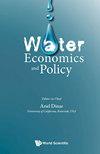A Potential PES Mechanism for Agroforestry-Led Industrial Wastewater Remediation Using Short-Rotation Trees
IF 1.3
4区 经济学
Q3 ECONOMICS
引用次数: 1
Abstract
Industrial effluents and municipal wastewaters are increasingly finding their way into freshwater bodies, posing serious health and environmental challenges. In this paper, the potential for industrial wastewater remediation through agroforestry is explored for a peri-urban farming region in India. Farmers are incentivized under a payment for ecosystem services (PES) mechanism to convert their farmlands into poplar-based agroforestry and utilize industrial effluents for irrigating trees. Additional income can be derived through sale of poplar timber which enhances the attractiveness of such a PES mechanism. A dynamic optimization model compares farmers’ optimal land use allocation to a socially optimal case. Further, the firm’s effluent discharge outcomes are compared to an alternative arrangement where it is fined for discharging untreated wastewater into waterbodies in the absence of the agroforestry remediation option. Results support the attractiveness of such PES mechanisms in addressing the industrial effluent discharge problem while simultaneously mitigating the effects of water scarcity through wastewater reclamation. The optimal level of tax required to accomplish complete treatment of effluents by polluting firms is several times higher compared to PES payments. Further, the incentive to convert farmland into poplar plantations improves with PES payments but declines with higher profitability of agricultural crops.利用短轮作树木修复农林业主导工业废水的潜在PES机制
工业废水和城市废水越来越多地进入淡水水体,对健康和环境构成严重挑战。在本文中,通过农林业工业废水修复的潜力进行了探讨,为印度城郊农业地区。在生态系统服务付费机制(PES)下,鼓励农民将农田转变为以杨树为基础的农林业,并利用工业废水灌溉树木。通过销售杨木木材可以获得额外收入,这增强了这种PES机制的吸引力。一个动态优化模型将农民的最优土地利用分配与社会最优情况进行比较。此外,将公司的污水排放结果与另一种安排进行比较,在没有农林复合补救方案的情况下,公司因将未经处理的废水排放到水体中而被罚款。结果支持这种PES机制在解决工业废水排放问题,同时通过废水回收减轻水资源短缺影响方面的吸引力。要使污染企业完全处理废水,所需的最优税收水平是PES支付的数倍。此外,将农田转变为杨树种植园的动机随着PES支付而提高,但随着农作物盈利能力的提高而下降。
本文章由计算机程序翻译,如有差异,请以英文原文为准。
求助全文
约1分钟内获得全文
求助全文

 求助内容:
求助内容: 应助结果提醒方式:
应助结果提醒方式:


